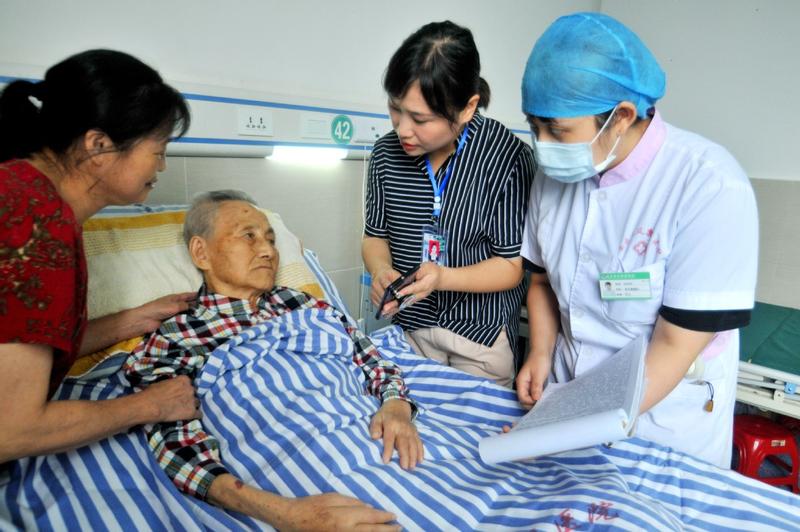 A community worker helps an elderly patient with online health insurance services at a hospital in Anqing, Anhui province, in July, 2020. (HUANG YOUAN / FOR CHINA DAILY)
A community worker helps an elderly patient with online health insurance services at a hospital in Anqing, Anhui province, in July, 2020. (HUANG YOUAN / FOR CHINA DAILY)
The insurance industry can play a bigger role in serving the country's new growth pattern of dual-circulation as well as its governance system and modernization of governance capacity, during the 14th Five-Year Plan period (2021-25).
In the dual-circulation paradigm, put forward at the Fifth Plenary Session of the 19th Central Committee of the Communist Party of China, which was held in Beijing from Oct 26 to Oct 29, the domestic market is the mainstay and domestic and foreign markets reinforce each other. Insurance can contribute to multiple sectors domestically.
For one thing, it can help the construction of a multi-pillar pension insurance system in China. Currently, there are three major pillars of the insurance system: the State-run fundamental insurance, enterprises annuity provided by employers and commercial pension insurance.
China's elderly population is estimated to surpass 300 million during the 2021-25 period, and the shortfall of pension will likely reach 8 trillion yuan (US$1.22 trillion) to 10 trillion yuan in the following five to 10 years. The 14th Five-Year Plan is likely to propose steadily building a long-term nursing insurance system, which will provide an opportunity for commercial pension insurance to help put together overall elderly security system.
Besides, some insurance companies have explored business in building communities for the elderly, where old people can be taken care of, receive medical services and join other entertaining activities. So the insurers' functions have expanded from the finance sector to diverse elderly services.
Insurance can contribute to multiple sectors domestically. For one thing, it can help the construction of a multi-pillar pension insurance system in China.
Insurance can also contribute to the country's rural revitalization strategy. During the 13th Five-Year Plan period (2016-20), agricultural insurance played an important role in serving poverty reduction, but its development is still at the initial stage.
The influence of agricultural insurance needs to be expanded, while the quality needs to be enhanced. During the 14th Five-Year Plan period, the insurance industry can help in economic compensation and risk management when the country continues to improve livelihood of poor people and promote rural revitalization.
Inclusive finance is another segment where insurance can play a role. Currently, advanced technologies such as big data, cloud computing, blockchain and AI are accelerating transformation of the insurance industry.
The application of technology diversifies the categories of insurance service and makes it possible to contain previously uncontrollable risk. Online underwriting and claims decrease operational costs. The insurance industry will provide more personalized, differentiated and cheap insurance products.
ALSO READ: Innovation to boost insurance sector
In addition, insurance can serve the country's major projects. As China's per capita GDP surpassed US$10,000, its demand for insurance has entered the stage of rapid growth, according to experience from other countries. Between 2016 and 2020, average annual growth of premium doubled that of GDP. During the 2021-25 period, the insurance market will keep a stable growth, to be able to offer long-term, steady financial support to the country's key projects in the sectors of "new infrastructure"-networks for 5G, big data, artificial intelligence, the internet of things, fintech, digitalization, automation, etc-new energy, new material, transportation and logistics.
In recent years, the insurance industry has seen a steady and upward development trend. It has supported the country's major strategies, the epidemic control and resumption of work this year.
From January to October, original premium income reached over 3.96 trillion yuan. The insurance industry offered risk security up to 7,348.5 trillion yuan to the whole society. Compensation expenses reached more than 1.1 trillion yuan. In 2019, critical illness insurance covered 1.1 billion people. Agricultural insurance provided risk security of 3.8 trillion yuan, as well as compensation of around 56 billion yuan, for farmers.
Insurance funds up to 600 billion yuan were put into the development of the Yangtze River Economic Belt, while 250 billion yuan of insurance funds were invested in the coordinated development of the Beijing-Tianjin-Hebei region. By the end of September, balance of insurance fund utilization reached about 20 trillion yuan, up 85 percent from the beginning of the 13th Five-Year Plan period.
The risk prevention capability has been strengthened. By the end of September, average comprehensive solvency adequacy ratio of 178 insurance companies reached 242.5 percent, with average core solvency adequacy ratio reaching 230.5 percent. It shows the overall operations of the insurance industry have stayed stable and overall risk is manageable.
READ MORE: State Council urges more personal health insurance
The industry also keeps opening up. Foreign-funded insurance market was growing during the January-October period, with original premium income surpassing 300 billion yuan, up 19.4 percent year-on-year, and market occupancy reaching 7.58 percent, up 2.78 percentage points from the beginning of the 13th Five-Year Plan period.
This year, the insurance industry helps in the fight against the COVID-19 pandemic by donating, supporting major projects and serving small and micro companies. During peak of the pandemic in China, the insurance industry donated captive insurance to the grassroots medical, government and community workers. Total compensation reached 516 million yuan. Gross donation reached 380 million yuan, mainly to Hubei province, the region hit hardest by the coronavirus domestically.
It is estimated that premium income will reach about 4.5 trillion yuan by the end of this year. Average annual growth of premium income is expected to reach about 13 percent during the 2016-20 period, while that of total insurance assets may reach about 12 percent.
The writer is secretary of the Party Committee, and president of the Insurance Association of China. The views don't necessarily reflect those of China Daily.


